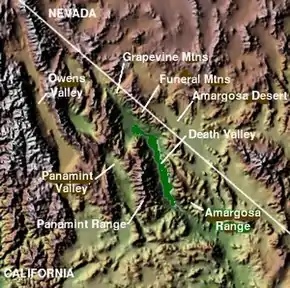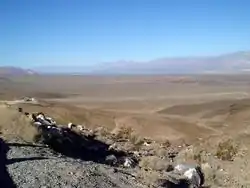Panamint Valley
The Panamint Valley is a long basin located east of the Argus and Slate ranges, and west of the Panamint Range in the northeastern reach of the Mojave Desert, in eastern California, United States.

Geography

The northern end of the valley is in Death Valley National Park and Inyo County, California. The valley lies in a north–south direction, and stretches from the Panamint Dunes in the north to the Naval Air Weapons Station China Lake in San Bernardino County in the south. The valley is approximately 65 miles (105 km) in length, and is more than 10 miles (16 km) wide in the Hall Canyon area.
Features
- The ghost town of Ballarat is located in the Panamint Valley about three miles east of Trona Road, near Happy Canyon.[1]
- The Panamint Springs Resort, on highway 190 west of Panamint Valley Road near Rainbow Canyon, provides the only lodging, dining, and gas in the area.[2]
- The former Epsom Salts Monorail crossed the valley on a wooden trestle.
- A radar station is located near the town of Ballarat at the south end of the valley.
- Barker Ranch, the last hideout of Charles Manson and the site at which he was arrested in 1969, is located at the southern end of the valley off Goler Canyon Road.
- The valley is an internally drained endorheic basin and its central salt flat/hardpan can contain an ephemeral lake, like it did after unusually heavy rains in the spring of 2005. During pluvial periods of the Pleistocene, inflow from a chain of streams and lakes to the northwest sustained a large lake known as Lake Panamint that overflowed into Lake Manly in Death Valley.[3][4]
 'Panamint Lake' in 2005, view near Ballarat
'Panamint Lake' in 2005, view near Ballarat State Route 190 crosses Panamint Valley
State Route 190 crosses Panamint Valley View on Panamint Valley from SR190 with flash floods and reflections in the water
View on Panamint Valley from SR190 with flash floods and reflections in the water
Military use

The airspace over Panamint Valley is part of the U.S. military's vast R-2508 Special Use Airspace Complex.[5] The Panamint Military Operating Area (MOA) covers the entire valley north to Hunter Mountain from 200 ft AGL (Above Ground Level) up to FL180 flight Level (flight level is approximately altitude above mean sea level in hundreds of feet), therefore, FL180 would be 18,000 feet) with an Air Traffic Control Assigned Airspace (ATCAA) located above the same area from FL180 up to FL600. The airspace is primarily used by military aircraft from Nellis AFB, Edwards AFB, NAWS China Lake, and NAS Lemoore for high and low altitude mission training. Military aircraft utilize radio communications on 291.6 MHz or 120.25 MHz while operating in the Panamint MOA; however, military aircraft throughout the R-2508 complex often use 315.9 MHz when conducting low altitude operations below 1500 ft above ground level.

References
- Sahagun, Louis (May 7, 2019). "A war is brewing over lithium mining at the edge of Death Valley". Los Angeles Times. Retrieved 2019-05-07.
- Scott, Kay; Scott, Kay L. (2009-04-14). Complete Guide to the National Park Lodges. Rowman & Littlefield. ISBN 978-0-7627-5578-3.
- Houghton, Samuel G. (1994). A trace of desert waters: the Great Basin story. Reno: University of Nevada Press.
- Jayko, A. S.; Forester, R. M.; Sharpe, S.; Smith, G. I., "The last Pluvial Highstand (Late Wisconsin, Tioga Age) in Panamint Valley, Southeast California", American Geophysical Union, Fall Meeting 2001, Bibcode:2001AGUFMPP42B0530J
- "Edwards AFB (dead link)". Archived from the original on 2006-04-03. Retrieved 2006-04-01.
Further reading
- Allan, Stuart (2005). California Road and Recreation Atlas. Benchmark Maps. pp. s. 87, 88 & 95. ISBN 0-929591-80-1.
External links
| Wikimedia Commons has media related to Panamint Valley. |